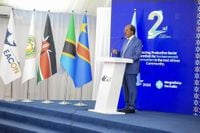In classrooms from Seoul to Mogadishu, and in digital exam halls across the globe, the role of language in education and society is shifting at a pace that’s hard to ignore. As the world celebrates linguistic diversity and the power of communication, three recent developments—South Korea’s Korean language boom, Somalia’s adoption of Swahili in schools, and the launch of Trinity College London’s AI-era English assessment—are reshaping how people learn, teach, and value languages in a rapidly changing world.
On October 7, 2025, the Korean language found itself in the global spotlight, not just in its homeland but on screens and stages worldwide. According to Korea Bizwire, the surge in interest is everywhere: in movie theaters across North America, audiences recently sang along in Korean during screenings of the Netflix animated hit K-Pop Demon Hunters. The film’s theme, “Golden,” has become an anthem for fans of K-culture, marking a moment when the Korean language leapt from Seoul’s pop stages to classrooms and smartphones around the world.
This enthusiasm isn’t limited to the pop charts or the silver screen. At Sogang University in Seoul, foreign students recently held a mock election—campaigning, giving speeches, and debating entirely in Korean. “I fell in love with EXO when I was in middle school, and that’s how I got interested in Korean,” shared Yulia, a 23-year-old student from Poland. She now hopes to become a Korean-language professor back home. Others cite a desire to better communicate with Korean patients or a fascination born from personal relationships and cultural hospitality.
The numbers speak volumes. Sogang University enrolled 3,653 students in Korean language courses in 2025, nearly matching last year’s total. Yonsei University reports about 2,300 students per semester from 151 countries, while Korea University hosts roughly 10,000 foreign learners annually. Clearly, Korean has moved from a niche academic pursuit to a global cultural language—one sung in stadiums, studied in universities, and shared across social media feeds.
The roots of this phenomenon run deep in pop culture. From Psy’s “Gangnam Style” in 2012, which introduced billions to the phrase “Oppan Gangnam style,” to BTS’s lyrical influence, K-Pop has become a gateway to language learning for millions. Now, groups like IVE and Enhypen perform to crowds in Europe and Latin America that sing along phonetically in Korean. K-dramas such as Squid Game have only amplified curiosity, and K-Pop Demon Hunters—which surpassed 300 million views by late September 2025—has woven Korean phrases like “unnie,” “gajaga,” and “so-reum-doda” into English dialogue, sparking a new wave of linguistic intrigue.
Social media has become a powerful classroom. Posts tagged #studyingKorean multiply daily, with TikTok videos teaching phrases such as “I’m hungry” (“배고파요”) garnering millions of views. Fans exchange tips on writing letters to K-pop idols or understanding drama dialogue without subtitles. As Professor Kwak Sang-heun of Sogang University’s Korean Language Education Center explained, “Our goal is simple—to help the world learn Korean not through textbooks alone, but through joy.” For millions humming K-pop choruses in Korean, that mission is well underway.
But Korean isn’t the only language making headlines this week. In Somalia, President Hassan Sheikh Mohamud announced at the East African Conference (EACON 2025) in Mogadishu that Swahili will be introduced into the national school curriculum. The move, reported on October 7, 2025, aims to strengthen regional integration following Somalia’s accession to the East African Community (EAC) in late 2023. “We must institutionalize and advance the Swahili language,” the President stated, calling on Somali universities—especially Somali National University—to lead the way in developing Swahili language education.
Education Minister Farah Abdulkadir outlined the ambition behind the initiative: “We are working to include the Swahili language in our education system so that more Somalis can speak it—ideally even more than those who speak English.” With Swahili spoken by over 150 million people in East and Central Africa, and as EAC leaders move to promote it as an official working language across all institutions, Somalia’s policy signals a significant step toward aligning the country’s linguistic and educational policies with those of its regional partners. The hope is that this will enhance cultural exchange, trade, and cooperation across East Africa, echoing Somalia’s earlier adoption of Arabic as a second national language during its time in the Arab League.
While Korean and Swahili are rising in prominence, English remains a global lingua franca—yet even here, the landscape is evolving. As artificial intelligence reshapes how we study, work, and communicate, stakeholders are questioning the future of English language learning and testing. If translation tools and generative text can produce fluent outputs, what should language tests actually measure?
Trinity College London’s answer, as reported on October 7, 2025, is ISE Digital: a new English language qualification designed to remain relevant in the AI era. ISE Digital goes beyond assessing proficiency, focusing instead on the competencies that enable learners to thrive in higher education and professional contexts. The speaking module, for example, requires candidates to prepare and deliver a short talk on a topic of their choice—demonstrating independent research, structured argument, and the ability to adapt in real time. This isn’t just about memorizing phrases; it’s about fostering autonomy, critical decision-making, and confident communication.
Reading and listening tasks in ISE Digital are crafted to encourage strategic processing—skimming, scanning, inferencing, and evaluation. As outlined in the research of Grabe, Rost, and Field, skilled reading and listening are active processes that require integrating details, context, and world knowledge. Writing tasks, meanwhile, include composing online texts such as emails and messages, as well as academic writing that demands synthesis, paraphrasing, knowledge transformation, and structured argumentation. These tasks highlight the critical engagement competencies that AI tools cannot replicate.
Paraskevi (Voula) Kanistra, associate director and senior researcher at Trinity College London, emphasized that ISE Digital does more than place learners on a CEFR scale. “It asks whether they can deliver a presentation, engage in dialogue, apply effective reading and listening strategies, communicate appropriately in digital formats, and transform knowledge through academic writing.” With adaptivity and leveling built into all four skills, the qualification aims to measure human-centered skills that remain essential—autonomy, critical thinking, and the ability to transform knowledge—while supporting ongoing learning.
As Korean, Swahili, and English each find new footing in a world shaped by technology and cultural exchange, one thing is clear: language remains at the heart of how people connect, learn, and thrive. Whether through the joy of K-pop, the promise of regional integration, or the challenge of proving real-world skills in an AI-driven era, the story of language in 2025 is one of adaptation, ambition, and enduring human curiosity.






